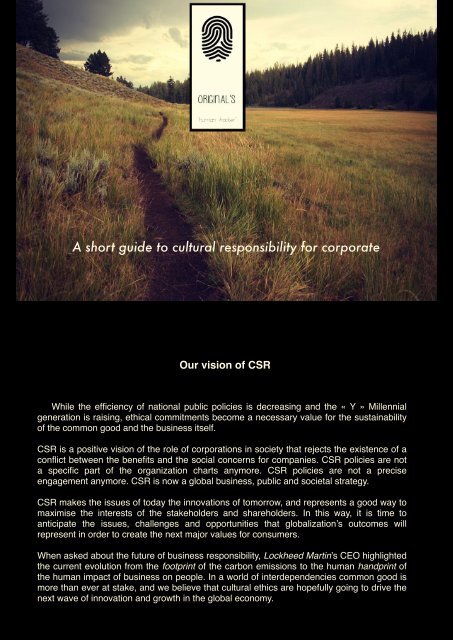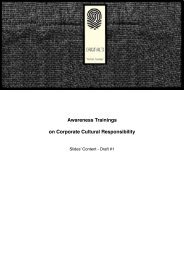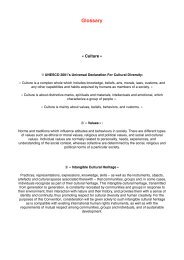Original's - A Short Guide to Cultural Responsibility for Corporate
Create successful ePaper yourself
Turn your PDF publications into a flip-book with our unique Google optimized e-Paper software.
A short guide <strong>to</strong> cultural responsibility <strong>for</strong> corporate<br />
Our vision of CSR<br />
While the efficiency of national public policies is decreasing and the « Y » Millennial<br />
generation is raising, ethical commitments become a necessary value <strong>for</strong> the sustainability<br />
of the common good and the business itself.<br />
CSR is a positive vision of the role of corporations in society that rejects the existence of a<br />
conflict between the benefits and the social concerns <strong>for</strong> companies. CSR policies are not<br />
a specific part of the organization charts anymore. CSR policies are not a precise<br />
engagement anymore. CSR is now a global business, public and societal strategy.<br />
CSR makes the issues of <strong>to</strong>day the innovations of <strong>to</strong>morrow, and represents a good way <strong>to</strong><br />
maximise the interests of the stakeholders and shareholders. In this way, it is time <strong>to</strong><br />
anticipate the issues, challenges and opportunities that globalization’s outcomes will<br />
represent in order <strong>to</strong> create the next major values <strong>for</strong> consumers.<br />
When asked about the future of business responsibility, Lockheed Martin’s CEO highlighted<br />
the current evolution from the footprint of the carbon emissions <strong>to</strong> the human handprint of<br />
the human impact of business on people. In a world of interdependencies common good is<br />
more than ever at stake, and we believe that cultural ethics are hopefully going <strong>to</strong> drive the<br />
next wave of innovation and growth in the global economy.
Why cultural responsibility ?<br />
Original’s commits <strong>for</strong> a new vision of the purpose of a corporation, that better takes in<strong>to</strong><br />
account the stakeholders’s cultural interests, ways of life and values.<br />
Several groups of stakeholders are concerned by cultural responsibility: boards, managers,<br />
workers, communities, terri<strong>to</strong>ries, shareholders and consumers.<br />
A lot of crisis <strong>to</strong>day have a cultural background and are connected <strong>to</strong> the dysfunctional<br />
purposes of business and market, while short-termism and costs cutting are leading <strong>to</strong> a<br />
decreasing trust and commitment <strong>for</strong> workers and <strong>to</strong> a lower macroeconomic demand in the<br />
EU as unemployment increases.<br />
Some of the biggest firms in the world have recently been criticized <strong>for</strong> « spreading the<br />
same sterile aesthetic across the world » and are facing <strong>to</strong>day a bad image of « cultural<br />
threateners ». <strong>Cultural</strong> costs can be huge <strong>for</strong> corporations in a world where collective<br />
identities are increasingly at stake. In this way, intangible actions, costs and profits will be<br />
key in a glocalized context when culture and identities are becoming one of the biggest<br />
concerns <strong>for</strong> consumers worldwide.<br />
While off-shore manufacturing sites and overseas supply chains are some of the biggest<br />
issues of <strong>to</strong>day’s business, cultural responsibility will be crucial when it is time <strong>to</strong> build<br />
strong long-term relations with workers, consumers and local communities.<br />
<strong>Cultural</strong> responsibility can also pacify an identity tense context in the western countries, and<br />
should be integrated in<strong>to</strong> new standards in corporate governance.<br />
Furthermore, the time of blockchain logics amongst individuals has come. Consumers are<br />
becoming collaborative « sharers » who increasingly mistrust the third parties that were the<br />
brands until now: companies will have <strong>to</strong> prove they can also favor the collectives and the<br />
identities in order <strong>to</strong> be trusted again and <strong>to</strong> be sustainable themselves.<br />
<strong>Cultural</strong> responsibility as a global corporate philosophy can lead <strong>to</strong> better relations with<br />
stakeholders, better efficiency <strong>for</strong> workers, better talented employees attraction, and <strong>to</strong><br />
better fulfil with the cus<strong>to</strong>mer’s expectations.<br />
Legislative context<br />
<strong>Cultural</strong> defense is becoming a main concern <strong>for</strong> international hard and soft rules,<br />
including the creation of robust standards thanks <strong>to</strong> the action of organizations such as the<br />
GRI, the European Commission, the UN, the UNESCO, the OECD and the Agenda 21 <strong>for</strong><br />
Culture.<br />
Identity loss and the risks of standardization that represents globalization are also leading <strong>to</strong><br />
a favorable context of cultural defense national regulations.
Who we are<br />
Original’s is a committed consulting firm using its expertise <strong>to</strong> solve a new kind of social<br />
issues <strong>for</strong> corporate.<br />
We are part of a global vision that helps corporations <strong>to</strong> provide benefits <strong>to</strong> the stakeholders<br />
involved. However, Original’s expertise is only focused on cultural issues.<br />
We help corporations <strong>to</strong> reduce negative cultural impacts and <strong>to</strong> contribute positively <strong>to</strong> the<br />
specificities of their overseas workers as well as of the terri<strong>to</strong>ries in which they operate.<br />
However, Original’s is willing <strong>to</strong> help companies <strong>to</strong> go even further: we help global<br />
companies <strong>to</strong> adapt <strong>to</strong> the post-globalized context, by becoming responsible, attractive and<br />
sustainable glocalized organizations.<br />
Our goals are:<br />
- <strong>to</strong> negotiate the complicated relationships between economic globalization, values<br />
standardization and cultural identities through evaluation, moni<strong>to</strong>ring and implementation.<br />
- <strong>to</strong> provide a strategic and open plat<strong>for</strong>m <strong>for</strong> experts and organizations interested in<br />
promoting cultural sustainability.<br />
- <strong>to</strong> foster an open discussion with all the stakeholders on <strong>Corporate</strong> Social <strong>Responsibility</strong><br />
and Sustainable <strong>Corporate</strong> Governance policies: we organize conversations and<br />
conferences in order <strong>to</strong> build strong relationships between business leaders, cultural<br />
experts, communities and stakeholders.<br />
- <strong>to</strong> provide an overview of <strong>Corporate</strong> <strong>Cultural</strong> <strong>Responsibility</strong> and its implications in terms of<br />
impact on communities and on business.<br />
- <strong>to</strong> develop per<strong>for</strong>mance standards and verifications processes in order <strong>to</strong> create corporate<br />
policies that enhance the competitiveness of the business while simultaneously help <strong>to</strong><br />
solve cultural challenges.<br />
- <strong>to</strong> avoid a tangible and concrete deglobalization by helping business ac<strong>to</strong>rs <strong>to</strong> become<br />
responsible and respectfull glocalized ac<strong>to</strong>rs.
contact@letsbeoriginals.com




